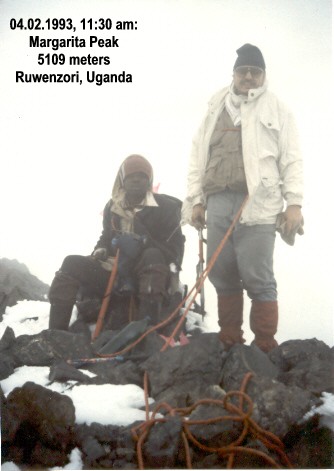Tödliche Umarmungen
Afrika muss viele Freunde haben, gemessen an den vielen Umarmungen, die der Kontinent erfährt. Leider sind es tödliche Umarmungen. Die Frage ist: Merkt es der so Umgarnte? (oder besser: Wollen es die politischen und wirtschaftlichen Eliten, denen es in erster Linie um die eigenen Vorteile geht, überhaupt sehen ...?)
Da sind die Chinesen, die sich als wahrer South-South Freund gerieren. Natürlich nur in Ländern, wo sie langfristige wirtschaftliche Interessen haben, an Rohstoffen wie Öl zum Beispiel (siehe Video >> Was will China in Afrika?). Billiges Geld (ohne Conditionalities), als Zugabe Infrastrukturgeschenke (z.B. die Fußballstadien in Ghana), die teilweise mit eigenen (chinesischen) Arbeitern gebaut werden, von denen dann nach Beendigung der Bauarbeiten gleich Hunderte im Land bleiben -- als dreiste Zugabe! Letztes Jahr sind die Staatschefs Afrikas nach Peking gepilgert, um das Ganze noch feierlich vertraglich abzusegnen.
Die Amis umarmen sowieso mit ihrem Millenium Challenge Account (u.a. um ungehindert ihre Fortress-like Botschaften bauen zu können). (Zu MCA siehe zB >> hier.) Da ich kein einseitiges Amerika-Bashing liebe, gehen wir doch gleich zu uns, den Europäern, und den Economic Partnership Agreements (EPAs). Dazu hatte ich mich schon kurz >> hier geäussert (siehe auch: >> Beware bilateral trade deals with the EU
"Ms. Jones said the EPA would exacerbate the way in which ACP countries were being integrated into the global economy if not stopped and push the 300 million peoples of the ACP countries into worse economic conditions that they faced now.
She argued that through the EPA, the EU sought to open up the economies of ACP countries up for heavily subsidized products from the EU, with very little commitments from the EU itself on how to assist the ACP countries to compete fairly.
She noted that whereas the ACP countries faced serious productions constraints in the products covered under the EPA, the EU on the other hand provided heavy subsidies to its local producers of goods covered under EPA, thereby giving EU producers unfair advantage over their ACP counterparts.
Ms Jones also noted that strict intellectual property rules proposed by the EU in the EPA would deepen the digital divide and challenge traditional farming methods, including seed saving, which was largely practised in the ACP countries." (Quelle: >> EPA will cost poor countries nine billion dollars annually
Beispiel zum Thema "Freihandel auf Augenhöhe" mit Europas subventionierten Agrarprodukten >> hier.
Nun kommen auch noch die Inder mit einer weiteren Umarmung, dem chinesischen Beispiel folgend, als Ausgangspunkt eine riesige Konferenz für afrikanische Staatsoberhäupter organisierend. Aber es ist nicht so, als wüssten die Afrikaner nicht, was da auf sie zukommt, also dass die Umarmungen mittel- bis langfristig tödlicher Natur sind:
CPP Warns Against New Scramble for
www.ghanaweb.com: General News of Thursday, 17 April 2008
The Convention People’s Party (CPP) has followed with absorbing interest the India-Africa Summit of 8-9th April 2008 in the Indian capital of
While the CPP fully supports cooperation between peoples and nations of good-will from all over the world, we are also worried that unless these “declarations” and frameworks” are jointly developed to take proper account of the varied and sometimes even conflicting interests of the parties involved, African leaders may end up being unwitting participants in a new “Scramble for Africa” to the detriment of our people. In the original Scramble for Africa, the continent was carved up into competing spheres of foreign economic influences and its natural resources used to fuel Europe’s industrial revolution at the expense of
In the case of the India Summit, the Delhi Declaration appears designed primarily to facilitate
In return,
Indeed,
By proposing “duty free” access for African raw materials, whose tariffs are already very low,
We, therefore, call upon the African Union to scrutinise the Delhi Declaration carefully before giving it its full blessing. Specifically, the AU must ensure that the industrial goods from
Lastly, parallel to these attempts at global cooperation, we urge the AU to accelerate efforts at expanding trade among African countries. We believe that the 8.4% of Africa’s GDP that is traded among Africans, compared to 50.6% with the rest of the world, is unacceptable and leaves
Quelle: >> ghanaweb.com
Indien, Amerika, China: was geht's uns an? Bei den EPAs sieht es schon anders aus, da sind wir Mittäter. Im Internet gibt es viele Infoseiten, z.B. die Stop EPA Kampagne >> hier, um etwas zu unternehmen! Ich meine, wir können durch Aufklärung in Deutschland bzw. Europa mehr für Afrika tun als mit Projekten bzw. EZ in Afrika.
Der Ausgewogenheit halber hier ein Link zu der DFID-Seite >> Ten myths about Economic Partnership Agreements. Ob die Argumente dort, die sich zunächst plausibel anhören, allerdings ausgewogen sind, wage ich zu bezweifeln! Die ex-Kolonialmacht ist nicht gerade für Interessenlosigkeit bekannt.
Hinweis: Dieser Beitrag wurde seit dem 22. April mehrmals leicht geändert, insbesondere durch Hinzufügen weiterführender Links.




Keine Kommentare:
Kommentar veröffentlichen